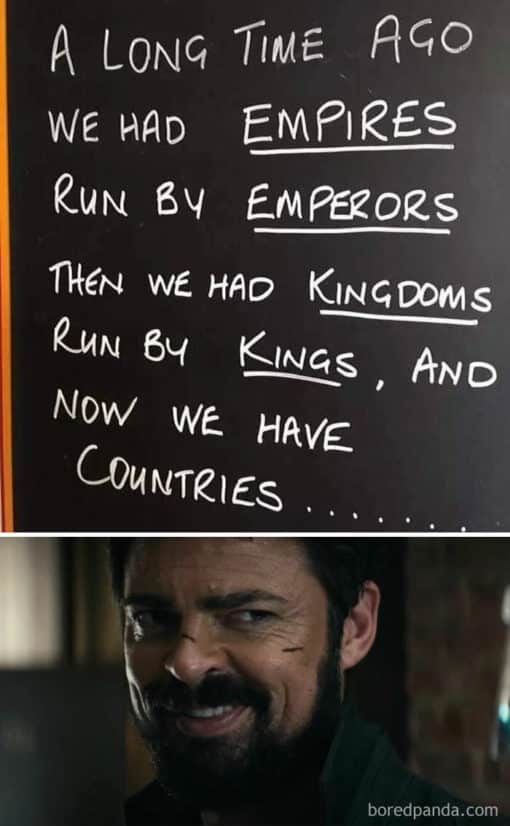A LONG TIME AGO WE HAD EMPIRES RUN BY EMPERORS THEN WE HAD KINGDOMS RUN BY KINGS AND NOW WE HAVE COUNTRIES
This image is a two-part montage that juxtaposes a humorous text with a reaction image below it. The upper part features a blackboard with a text written in white chalk that says, "A LONG TIME AGO WE HAD EMPIRES RUN BY EMPERORS THEN WE HAD KINGDOMS RUN BY KINGS, AND NOW WE HAVE COUNTRIES ...". The words "EMPIRES", "EMPERORS", "KINGDOMS", and "KINGS" are underlined for emphasis.
The humor in this text comes from an implied wordplay that is left hanging by the ellipsis following "COUNTRIES". The pattern set up by the previous two lines would suggest that countries should logically be run by "Counts", complementing the structure of empires being ruled by emperors and kingdoms by kings. The joke plays with the reader's anticipation of a consistent linguistic pattern, only to subvert it by not completing the thought explicitly.
Below the blackboard text is an image of a person, offering what appears to be a smirking or realizing facial expression. This person seems amused, almost as if they are in on the joke the text above has set up. This reaction image works effectively to prompt the viewer to consider the punchline that the text has left hanging and perhaps to revel in the cleverness of the implied wordplay.
The individual in the bottom image appears to be a man with facial hair and a small mark or scar under his left eye. His smile and the twinkle in his eyes reinforce the sense of amusement conveyed by the blackboard message. It's as if the smirk is a direct response to the humor derived from the text, embodying the moment when the realization of the joke hits.
The text's humor is further amplified by the addition of the website reference "boredpanda.com" in the lower part of the image. This suggests that the image was likely shared on an entertainment or humor website, which often curate content that is meant to be funny, ironic, or clever. The presence of this reference frames the text and reaction as content designed for light-hearted consumption and shared amusement.
In sum, the image works on two levels: first, by playing with language and historical structures of governance and, second, by pairing it with a human reaction that captures the "aha!" moment of getting the joke. This combination might appeal to someone's appreciation for wordplay, historical trivia, and the universal moment of shared understanding when a joke lands successfully. A LONG TIME AGO WE HAD EMPIRES RUN BY EMPERORS THEN WE HAD KINGDOMS RUN BY KINGS AND NOW WE HAVE COUNTRIES
